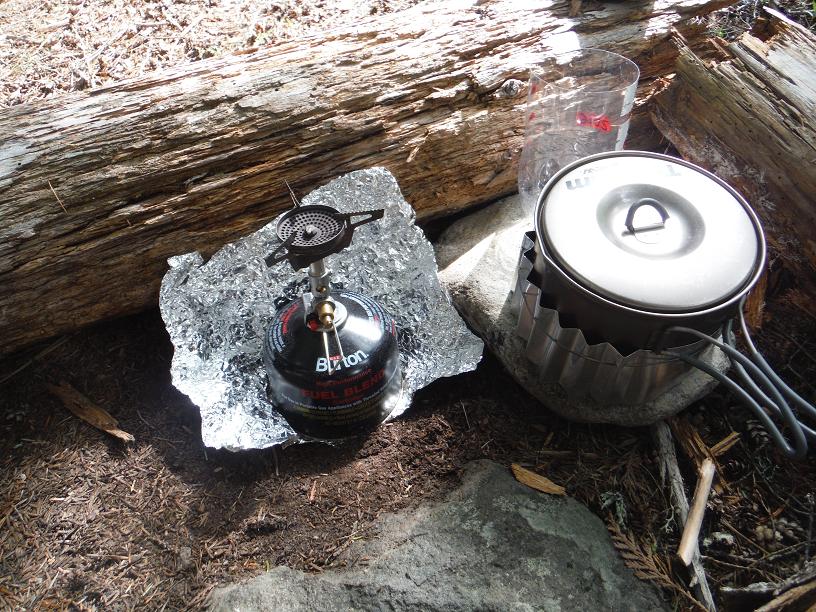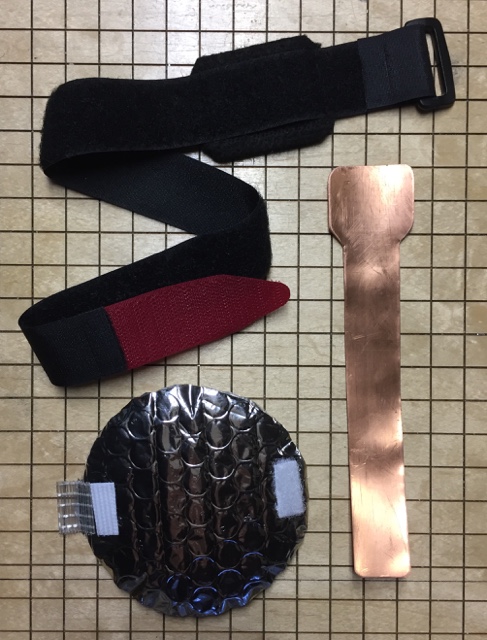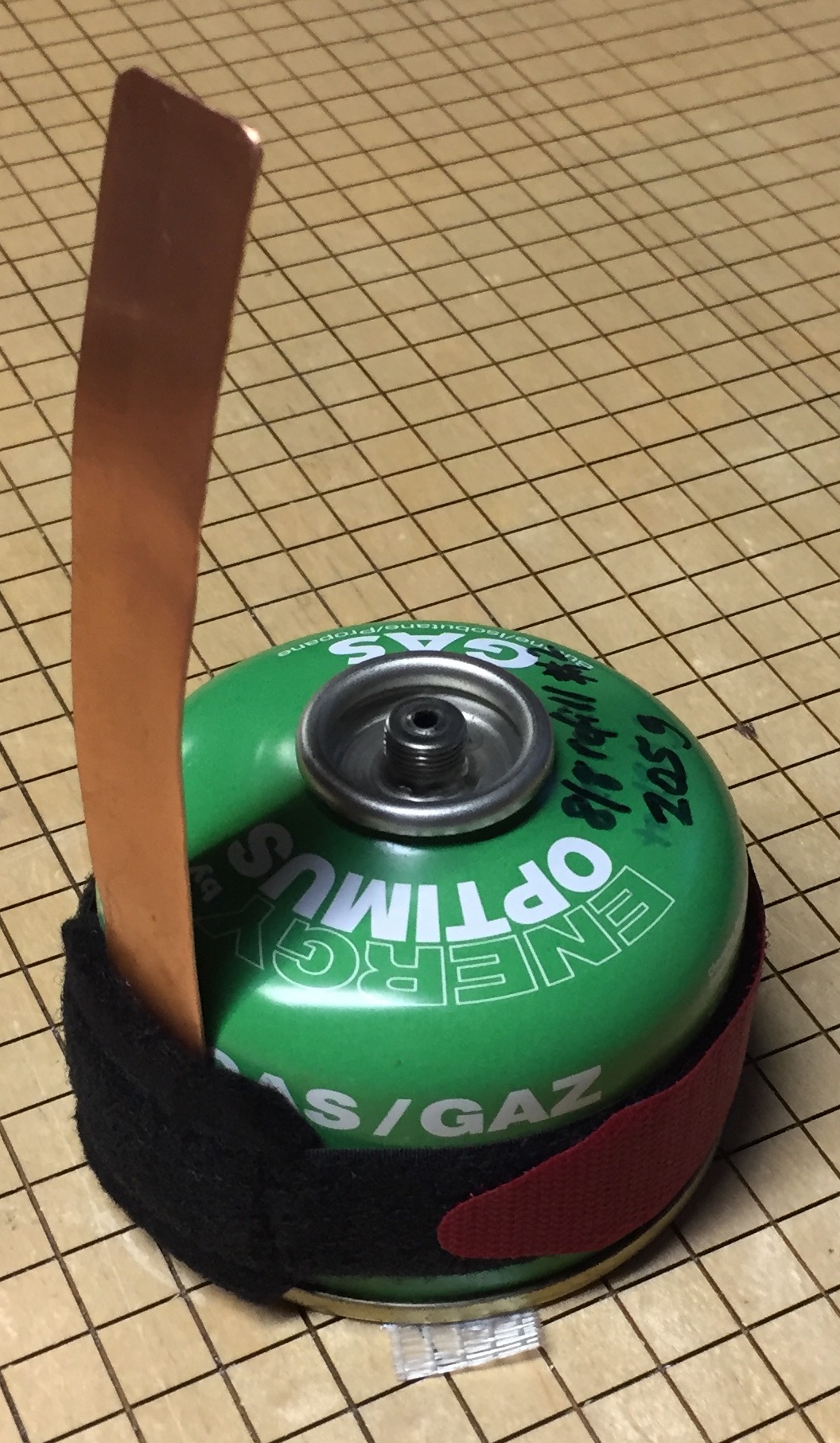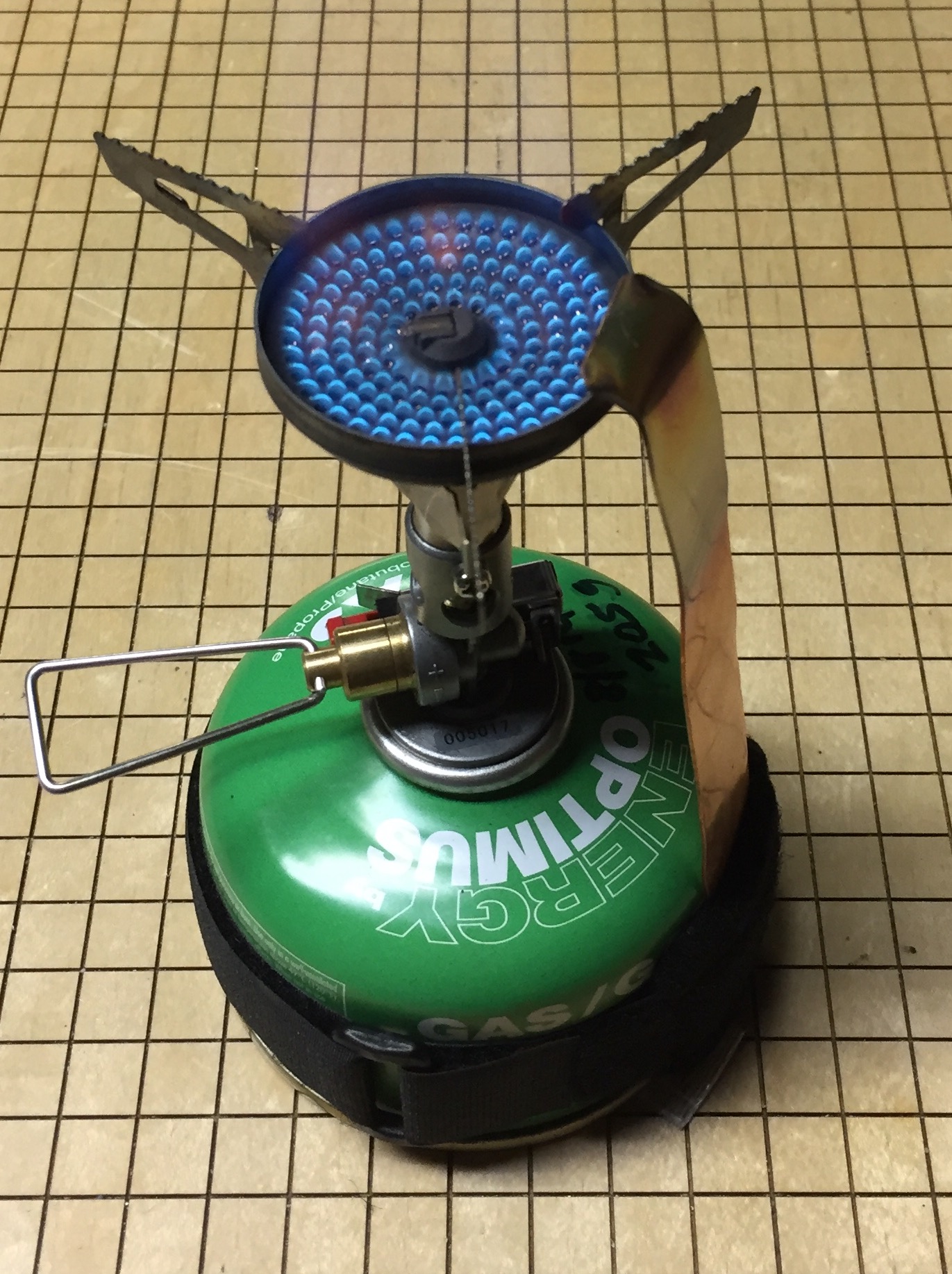Topic
Jetboil cold weather heat exchanger
Forum Posting
A Membership is required to post in the forums. Login or become a member to post in the member forums!
Home › Forums › Gear Forums › Make Your Own Gear › Jetboil cold weather heat exchanger
- This topic has 248 replies, 5 voices, and was last updated 4 years, 10 months ago by
 Jerry Adams.
Jerry Adams.
-
AuthorPosts
-
Mar 11, 2016 at 8:15 am #3388249
“PS, I would also note that these “low temperatures” are laughably balmy…”
Somebody try using aluminum foil at low temp, like 15 or 20 F
Preferably a canister that’s mostly empty, N butane would be good
How long does it take to boil with and without foil
Mar 15, 2016 at 8:22 am #3389234Without an external heat source, using a nearly empty canister of n-butane you would not be able to boil even 1 cup of water at 20°F ambient even with the canister starting temp at 70°F. It would start but the flame would die out very quickly.
With the canister at 20°F (ambient) it won’t even start because n-butane vapor temp is 31°F. At 31°F ambient the stove also wouldn’t run very long because of cooling from evaporation.
So there is a question to be answered here, which is “At what temperature will a canister containing straight n-butane run full power to the end without any external heat source?” (And I mean really, actually and not theoretically, mathematically.) Temps this week in my lab are in a good range (mid-40s to low 50s) to test this, so maybe I’ll have a go at it.
Mar 15, 2016 at 9:05 am #3389240Yes, Bob, I would certainly like to see what you come up with on this, “really, actually.” I do wish that there was a Korean grocery store around here that stocked n-butane canisters.
Mar 15, 2016 at 9:14 am #3389244I do wish that there was a Korean grocery store around here that stocked n-butane canisters.
Gary, maybe this place in your area?
You might also look for local restaurant supply stores. The tabletop butane burners are very popular for breakfast/brunch set-ups at some restaurants. You might have to buy a case of them, however!
Mar 15, 2016 at 10:03 am #3389261yeah, actual testing is the ultimate
sometimes theory can lead you to things to try
unemployed engineers can amuse themselves with theory, probably a few others reading this : )
“Without an external heat source, using a nearly empty canister of n-butane you would not be able to boil even 1 cup of water at 20°F ambient even with the canister starting temp at 70°F. It would start but the flame would die out very quickly.”
theoretically, if you reflect heat with aluminum reflector, the canister will start heating up faster than with a heat strip – it takes one minute or so to propagate heat down strip. And it takes one minute or so for the temperature of the butane to drop significantly from evaporative cooling
The more empty a canister is, the worse it works at cold temps. If you could only operate with a half full or fuller canister you’ve lost half the capacity of the canister. If you could operate down to 1/4 full, you only lose 1/4 of your capacity.
Mar 24, 2016 at 10:42 am #3391550hey Bob. Well I finally got to use your set up with my new Jet Boil mini mo stove this past weekend. I headed up to the catskills on Friday for the weekend. Friday evening there was hail, rain, snow, lots of heavy wind and bitter cold. I used the jetboil and the contraption I got from you to boil potatoes for our Corned beef that we also cooked. Let me tell you that it worked perfect!! My friend who was also using a canister stove was having some problems with his frosting up and not burning efficiently. Thanks again for helping me out to complete my winter kit, I am all set!! Joe
Mar 24, 2016 at 11:18 am #3391562how cold was it, how full was your canister, and how full was your friend’s canister?
Mar 24, 2016 at 11:23 am #3391564Hey, Joe!
Glad to hear it worked well for you. I’ve used it a bunch of times and am not surprised, lol!
Where were you guys? Weekend before we did WCS loop from Woodland Valley and camped between Cornell and Slide. A bit windy but barely got down to freezing, if that. No snow just some ice on on the north-sloping, sheltered trails. Didn’t even take microspikes and was fine with my Merrell trail runners.
Mar 24, 2016 at 12:17 pm #3391582Still waiting for the day when canister manufacturers figure out to make canisters lower and wider for better stability and less windscreen area necessity.
Mar 24, 2016 at 12:37 pm #3391590The Minimo is actually pretty good in these departments because of the short, wide pot and the burner head that sticks up under the HX fin shroud, which lowers the overall height and protects it from the wind somewhat. And of course the pot also locks to the pot supports on the stove, if desired.
I’m sure there are locales and situations where an integrated windscreen is the only thing that will work. However, 99 times out of 100 I can figure out a way to use found natural materials and features to shield the stove from wind… stuff like a rock shelf and a slab of rock, or a tree with a snow platform on the lee side. (second photo using setup with BRS-3000T)

 Mar 24, 2016 at 1:28 pm #3391603
Mar 24, 2016 at 1:28 pm #3391603Alexander, MSR tried that with their first version of the 110 gram IsoPro canister. When others came up with what is now the 110 g. canister standard, MSR couldn’t compete, so they wisely followed suit.. Their low/wide canister had so much more metal (thus heavier) than the Jetboil, Snow Peak, etc. versions. Also, the original MSR 4 oz. canister wouldn’t fit inside our smaller pots for transport.
Mar 24, 2016 at 2:32 pm #3391625That’s a good point, Gary. I had completely forgotten about that and it wasn’t all that long ago!
Also, there are some canister stabilizer legs out there, with a set included in every JB stove purchase, and MSR also makes one as an accessory. I use the JB canister legs when using the tall Sumo pot.
 Mar 25, 2016 at 9:15 am #3391785
Mar 25, 2016 at 9:15 am #3391785we hiked up to Giant ledge on Friday. Hiked up Panther Mt on Saturday (just a day before the cutoff date required for a winter climb for 3500). It was windy as heck on friday evening , temps were about 17 degrees or so..a coating of snow and ice covered the ground. Both cannisters were brand new and full. He was using a wind-pro stove, i was using the jetboil minimo with Moulder heat thingy. It may have been colder with the wind chill up there, so I am guesstimating 17 degrees. I did set the stove next to a giant boulder to help block the wind. Thanks again Bob, im sooo happy. I posted pictures on instagram of the trip.. dirtbag_hiker, if anyone interested.
Mar 25, 2016 at 1:30 pm #3391835I looked at your instagram page — looks like you had some weather, for sure, but the total lack of snow otherwise is bizarre, especially compared to last year!
Nice to hear about a real-world stove comparison right there in the hills.
And you used that itty-bitty tarp and bivy?? You da man, lol
Mar 28, 2016 at 3:10 pm #3392466yes Bob..lack of snow this year was sad. It was cold..but no snow over all. I big whopper blizzard and 2 small storms..made for a shameful winter. That itty bitty tarp n bivy is the Mountainlaurel designs cuben grace solo tarp and the bivy is Borah gears snowyside event bivy, with a custom mod for dual 2 way zipper across the chest and down both sides. Hey, they worked perfect along with my stove and your heating device!!
May 1, 2016 at 10:05 am #3399008I can’t get anyone to try this in really cold temps : )
It was 28 F. 1/4 full 8 ounce canister. I used it normally but it was too cold so it slowed way down after a while. 4 minutes to boil a pint of water. Still totally usable though.
Then I put a 12 inch square of aluminum foil. 0.1 ounce:

Worked normally. 3 minutes to boil one pint of water.
I just wonder how cold this could work at. Maybe next winter I’ll get a colder test.
Oct 12, 2016 at 7:29 am #3430721I think this is one of the best ideas (Moulder Hx Method) and related threads I have come across in some time. Gary Dunkel put me on to it last spring when it was too late to put the concept to a personal test, other than to gather materials. With the goal of a system that adds at most 1 oz or 28 g weight, I’ve now come up with my own iteration, consisting of a carbon felt pad sewn to the inside of a velcro strap, plus copper strip, plus a Reflectix canister-bottom insert. (bottom cozy). As the copper I was able to source was 0.025″ thick, I cut the strip to be 13/16″ wide for most of its length (so that the conducting cross section would more closely match Bob’s 0.02″ by 1″ wide version), widening to 1.25″ under the pad where it contacts the canister. The bottom cozy is a circle of Reflectix that inserts under the canister, held in place by two small velcro pads so that it can be removed for any needed bic lighter pre-warming of the canister (see thread). I’m hoping that the heat retention of the velcro strap itself and the bottom cozy will make a full cozy superfluous, but we will see if that is true. The components weigh exactly 28g/1oz – testing to come, but I’m very confident from the thread posts that I’ll be lightly cooking in the cold.
Oct 12, 2016 at 9:45 am #3430735Way to go, Rob! Please post some photos of what you’ve come up with, so we might see exactly what it looks like. If nothing else, geeking out over this concept gives us a reason to look forward to the impending frigid days of December, no?
Edit: Rob, Bob and I both experienced a lowered efficiency of our copper strips with the 220 g. canisters compared to the 110 g. ones. We think it is due to the increased surface area of the larger canisters. We both found that while we might get by (sort of…) without using a cozy with the 110 g. canisters, it is rather imperative to use one with the 220 g. canisters. Let us know how this plays out with your testing.
Oct 12, 2016 at 10:32 am #3430744Robert, it is great that you’re giving this concept a whirl. I don’t see any reason your version shouldn’t work well, although Gary’s caveat about the greater surface area of the 220g canisters is something to keep in mind, and it will become more of an issue if using something like straight n-butane in very cold temps, say 15*F and colder. Other than that, it really doesn’t matter what fuel blend is used since the HX strip eliminates the need for so-called ‘winter’ blends.Per Gary, I’d also like to see a photo of your setup.
Oct 12, 2016 at 5:34 pm #3430837
 Here’s some photos. Nothing earth-shattering.Oct 12, 2016 at 7:14 pm #3430863
Here’s some photos. Nothing earth-shattering.Oct 12, 2016 at 7:14 pm #3430863 Tonight I did a test to see if I could make the canister overheat. No worries. Got a bit warmer is all, not too warm to touch or leave fingers on at all. Now I need some cold temps for the rest of the test. More pics:
Tonight I did a test to see if I could make the canister overheat. No worries. Got a bit warmer is all, not too warm to touch or leave fingers on at all. Now I need some cold temps for the rest of the test. More pics:
 Oct 12, 2016 at 8:03 pm #3430877
Oct 12, 2016 at 8:03 pm #3430877That should work just fine, Robert; here’s hoping for cold weather soon! :^)
One consideration with the Soto Windmaster, however, is that the burner head is concave and larger — with the flame therefore less concentrated — than something such as the BRS-3000T, SP Giga or MSR Pocket Rocket, so in very cold weather you might want to have a bit more of the copper sticking into the burner head. Also, the Windmaster sits fairly high, and the heat must travel a bit farther down the strip.
Regarding overheating, I did a test summer before last where I ran a MiniMo and a BRS-3000T at full power 30 minutes at 80dgF with cozies without overheating. They got uncomfortably warm (over 100degF) but remained comfortably within the DoT rating of 122degF in this extreme abuse of the system….. Not that I’d recommend this!! But I am convinced that at the temperatures the HX strip would normally be used — about 45degF and below, depending upon fuel blend and fuel level in the canister — there will be absolutely no problem.
Looking forward to your field reports.
Oct 12, 2016 at 8:57 pm #3430888I thought about covering the middle of the copper strip with silicone tape to reduce heat loss if necessary. Do you like that idea?
Oct 13, 2016 at 4:27 am #3430916It probably wouldn’t hurt to experiment.
However, I’d test it with the current configuration first with a little more of the strip sticking into the flame, and even that might not be necessary depending upon ambient temperature.
The only time the HX strip didn’t work for me was when I tried it with a Primus Classic Trail Stove — the large burner head didn’t concentrate the heat well enough to get the copper strip adequately hot.

That sure is a darn fine (but heavy!) stove for actual cooking in benign conditions, however.
Nov 14, 2016 at 8:43 am #3435505@ Bob Moulder – you were right that my Soto Windmaster wider burner head did not heat up the copper strip I made as well as a more focused burner head would. This led me to come up with version #2, in which I flared the top of the strip out to be 1.5″ wide to catch more of the burner flame. In backyard testing, the canister warmth was noticeably improved with this mod (I could feel the canister getting warmer than previously). I was out on trail this past weekend, with morning temps for the three breakfasts I made in the 20-25 deg F range, and my HX system worked perfectly, even down to a nearly empty canister. The others in my group using unmodified Jetboils and other canister stoves were having pretty poor performance, especially as their canisters got emptier (and they had used all their propane up, I assume).
-
AuthorPosts
- You must be logged in to reply to this topic.
Forum Posting
A Membership is required to post in the forums. Login or become a member to post in the member forums!
Trail Days Online! 2025 is this week:
Thursday, February 27 through Saturday, March 1 - Registration is Free.
Our Community Posts are Moderated
Backpacking Light community posts are moderated and here to foster helpful and positive discussions about lightweight backpacking. Please be mindful of our values and boundaries and review our Community Guidelines prior to posting.
Get the Newsletter
Gear Research & Discovery Tools
- Browse our curated Gear Shop
- See the latest Gear Deals and Sales
- Our Recommendations
- Search for Gear on Sale with the Gear Finder
- Used Gear Swap
- Member Gear Reviews and BPL Gear Review Articles
- Browse by Gear Type or Brand.






 Here’s some photos. Nothing earth-shattering.
Here’s some photos. Nothing earth-shattering. Tonight I did a test to see if I could make the canister overheat. No worries. Got a bit warmer is all, not too warm to touch or leave fingers on at all. Now I need some cold temps for the rest of the test. More pics:
Tonight I did a test to see if I could make the canister overheat. No worries. Got a bit warmer is all, not too warm to touch or leave fingers on at all. Now I need some cold temps for the rest of the test. More pics:




